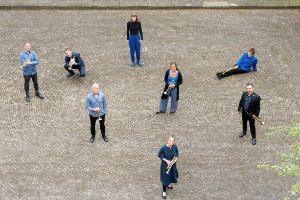Concert
silent green 4
Mazen Kerbaj // Global Breath 3 / Ensemble Musikfabrik // Raven Chacon / The Monochrome Project 2

The Monochrome Project © Janet Sinica
Mazen Kerbaj presents the world premiere of his composition “From One War to Another”, in which he mixes acoustic, electro-acoustic and electronic sounds and reflects “on how his own role has been altered in experiencing the 2006 Lebanon war and the ongoing Israeli war on Gaza: The memory of violence experienced firsthand has been replaced by the voyeurism of violence inflicted on others.” (Kerbaj) He uses his own adapted version of the crackle synth, one of the first battery-operated electronic instruments with integrated speakers, which uses the physicality of the performers to generate sound. It is followed by a concert from the research project Global Breath, initiated by Marco Blaauw to explore the question of whether the sound of the trumpet can be an element to unite everyone who hears it. This search has yielded numerous new works, including compositions by Milica Djordjević, Wadada Leo Smith, Liza Lim, Oscar Bianchi and Blaauw himself, who examines the natural tonal qualities and possibilities of conch shells in “Enigma”. The concert programme for the trumpet ensemble The Monochrome Project features works by the American composer, performer and installation artist Raven Chacon including “Call for the Company, in the Morning” which takes as its starting point the traditional calls and signals of horns used in fox hunting
Programme
Mazen Kerbaj
With a Little Help From My Friends II: From One War to Another
for trumpet and crackle synth (2025)
Commissioned by MaerzMusik
World premiere
With
Mazen Kerbaj – trumpet, crackle synth
Global Breath 3 with Ensemble Musikfabrik
Milica Djordjević
TRI
for contrabass clarinet, trumpet and percussion (2025)
Commissioned by Marco Blaauw, sponsored by Musikfonds e. V. and Kunststiftung NRW
Marco Blaauw
Enigma
for six conch shell horns (2024)
Wadada Leo Smith
The Celebration of Unity with the Indigenous People’s Nations Across the USA
for one percussionist, four concert-toned bass drums, West African Gankogui bell and classic Atoke bell (one of each), two Tibetan/Himalayan singing bowls (one large, one small to be struck) (2025)
Liza Lim
Incandescent Tongue
for soprano and trumpet (2020)
Liza Lim
Microbiome
for bass clarinet (2020)
Oscar Bianchi
Confessioni
for soprano and trumpet (2024)
With
Ensemble Musikfabrik
Carl Rosman – contrabass clarinet, bass clarinet
Marco Blaauw – trumpet
Dirk Rothbrust – percussion
Katrīna Paula Felsberga – soprano
Christine Chapman, Rike Huy, Bob Koertshuis, Nathan Plante, Markus Schwind, Laura Vukobratović – conch shell horn
Raven Chacon with The Monochrome Project 2
Raven Chacon
Whistle Quartet
for dog whistles (2001)
Raven Chacon
Solo for live electronics (work in progress)
Raven Chacon
Call for the Company, in the Morning
for eight trumpets (2022)
Commisioned by the BBC and hcmf//
With
The Monochrome Project
Marco Blaauw, Christine Chapman, Mathilde Conley, Rike Huy, Bob Koertshuis, Nathan Plante, Markus Schwind, Laura Vukobratović – trumpet
Raven Chacon – live electronics
Global Breath is supported by Ernst von Siemens Music Foundation, Musikfonds Neustart Kultur and Kunststiftung NRW.
The Monochrome Project is supported by Kunststiftung NRW and the Ministry for Culture and Science of the State of North Rhine-Westphalia.
 |  |